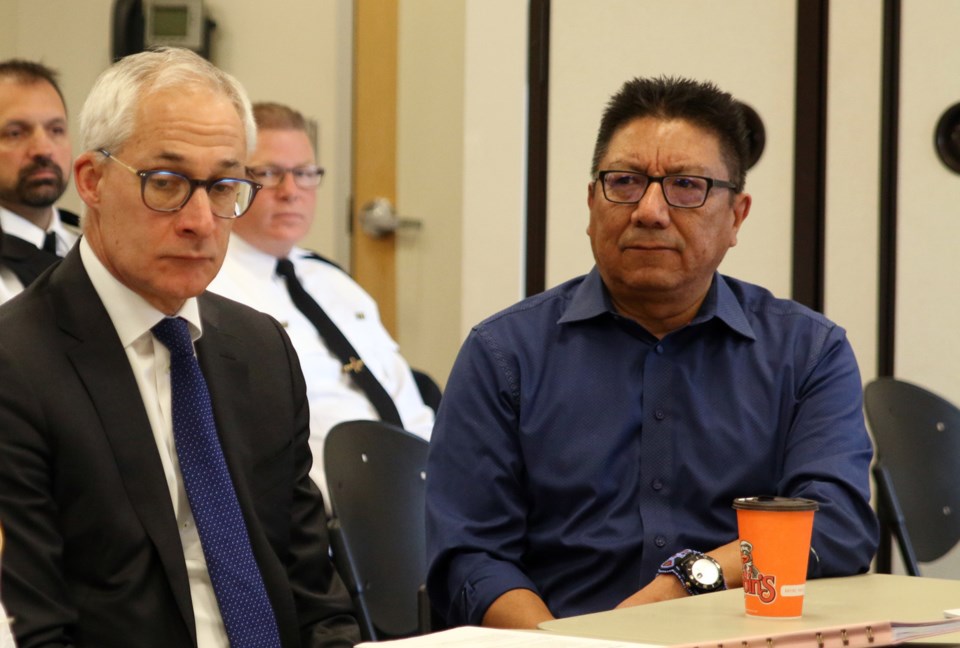THUNDER BAY - Following the release of the report by Office the Independent Police Review Director that called for the reinvestigation into nine Indigenous deaths, the terms of reference, structure, and timeline to complete it have been determined.
Dirk Huyer, chief coroner for Ontario, along with Nishnawbe Aski Nation Grand Chief, Alvin Fiddler, and Thunder Bay Police Service chief, Sylvie Hauth, outlined the reinvestigation structure to the Thunder Bay Police Services Board on Tuesday.
“What we’ve done is we’ve brought together the chief forensic pathologist, myself, the chief coroner, chief of Thunder Bay Police Service, and Grand Chief Fddler, and an elder to pull together a plan for the reinvestigation of these deaths,” Huyer said.
Gerry McNeilly, in his report, Broken Promises, called for the reinvestigation into the sudden deaths of Christine Gliddy, Shania Bob, Marie Spence, Aaron Loon, Sarah Moonias, as well as four cases involved in the Seven Youth Inquest – Jethro Anderson, Curran Strang, Kyle Morrisseau, and Jordan Wabasse.
McNeilly determined the initial investigations lacked quality and should be reopened.
Earlier this year, the three-tiered framework was revealed, which includes an executive governance committee, an investigative resource committee, and a blended investigative team.
“We will have a blended investigative team led by a retired detective inspector from the OPP named Ken Leppert, and he is bringing together a team of Thunder Bay Police Service investigators and Nishnawbe Aski Nation Police Service representatives and they will look at each of these deaths starting fresh with the information we have,” Huyer said.
The cases will be investigated from oldest to the most recent and Huyer said the families will be an important part of how the investigations move forward.
“That will include primarily at the start, reaching out to the families to understand additional questions the families may have, other areas they feel may not have been explored, and that will set the stage for what investigation needs to occur,” he said.
But according to Fiddler, it is important that the families feel supported throughout this process, through proper communication and supports.
“I think that is going to be a very critical piece moving forward,” he said. “The families need to have some confidence in the process and know they will be supported if they choose to participate in the reinvestigation.”
Fiddler added that he doesn’t know if all the families will participate, but he is hopeful they will, and they are working hard to ensure they will be supported through the entire process to get the answers to questions they have faced for so many years.
“I think that’s why we are working so hard to build all these support pieces into place, whether it’s language or mental health supports to the family know these supports will be available to them, maybe they will engage,” Fiddler said.
“To me it’s important that they be a part of this. Whether they will or not is difficult to say at this point. I hope they do. I know some of these families personally and I know they’ve suffered for a long time and this may be the last opportunity for the to get the answers they have been looking for for a long time.”
The reinvestigations are expected to be complete by next July, but Huyer said the teams will take as long as they need to get it right.
“Each investigation requires the time necessary to get the best answers,” he said. “We will not be forced into completing things in a time frame if more work needs to be done. Really that will lead us to the direction we need to go and the time that needs to be taken.”
“We can’t predict where they go, but the purpose is to have the best answers to the highest quality we can get to understand these deaths for the families, the communities, as well as those in nations around Thunder Bay.”
The executive governance committee will meet to discuss further steps for moving forward.
